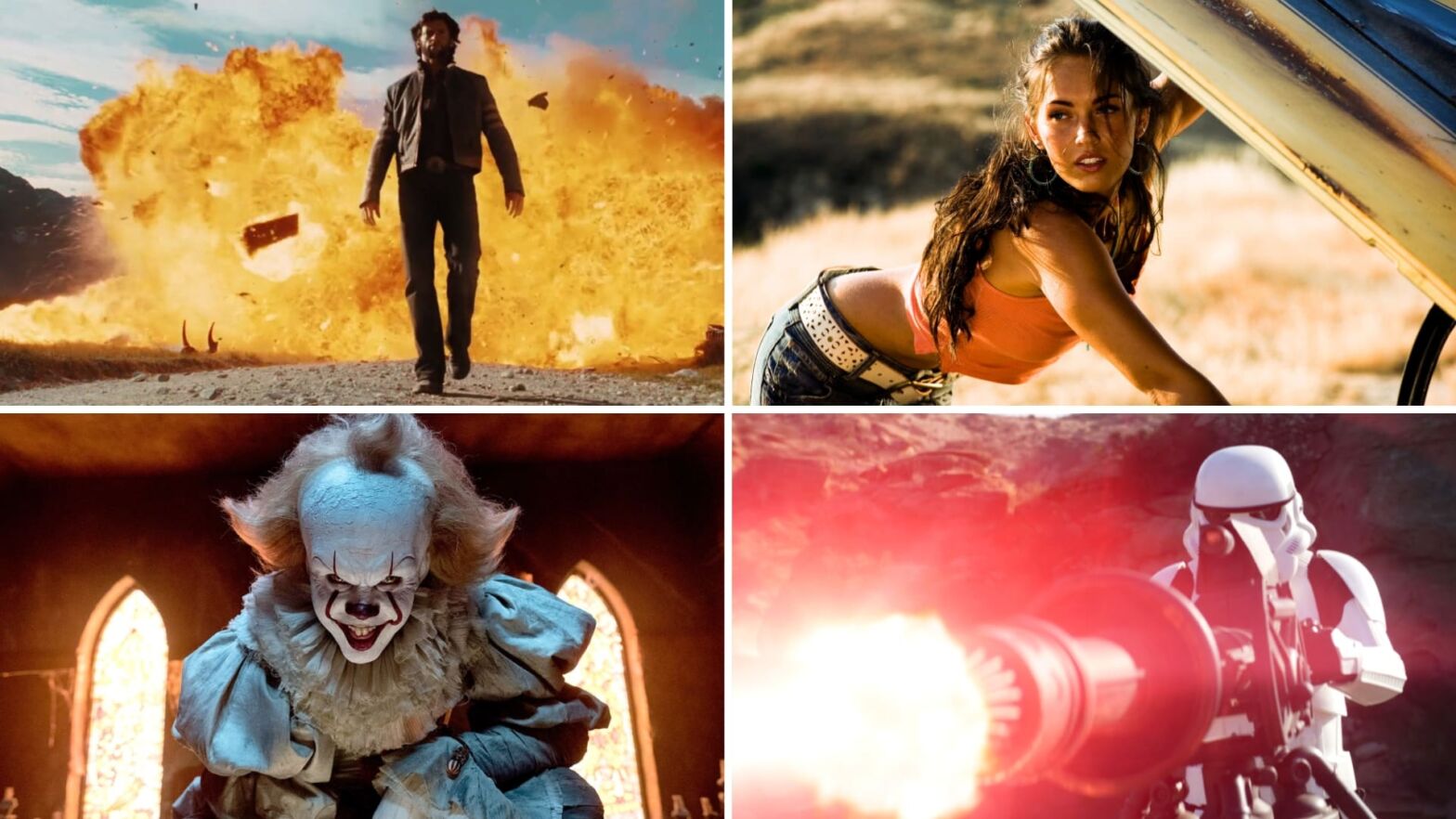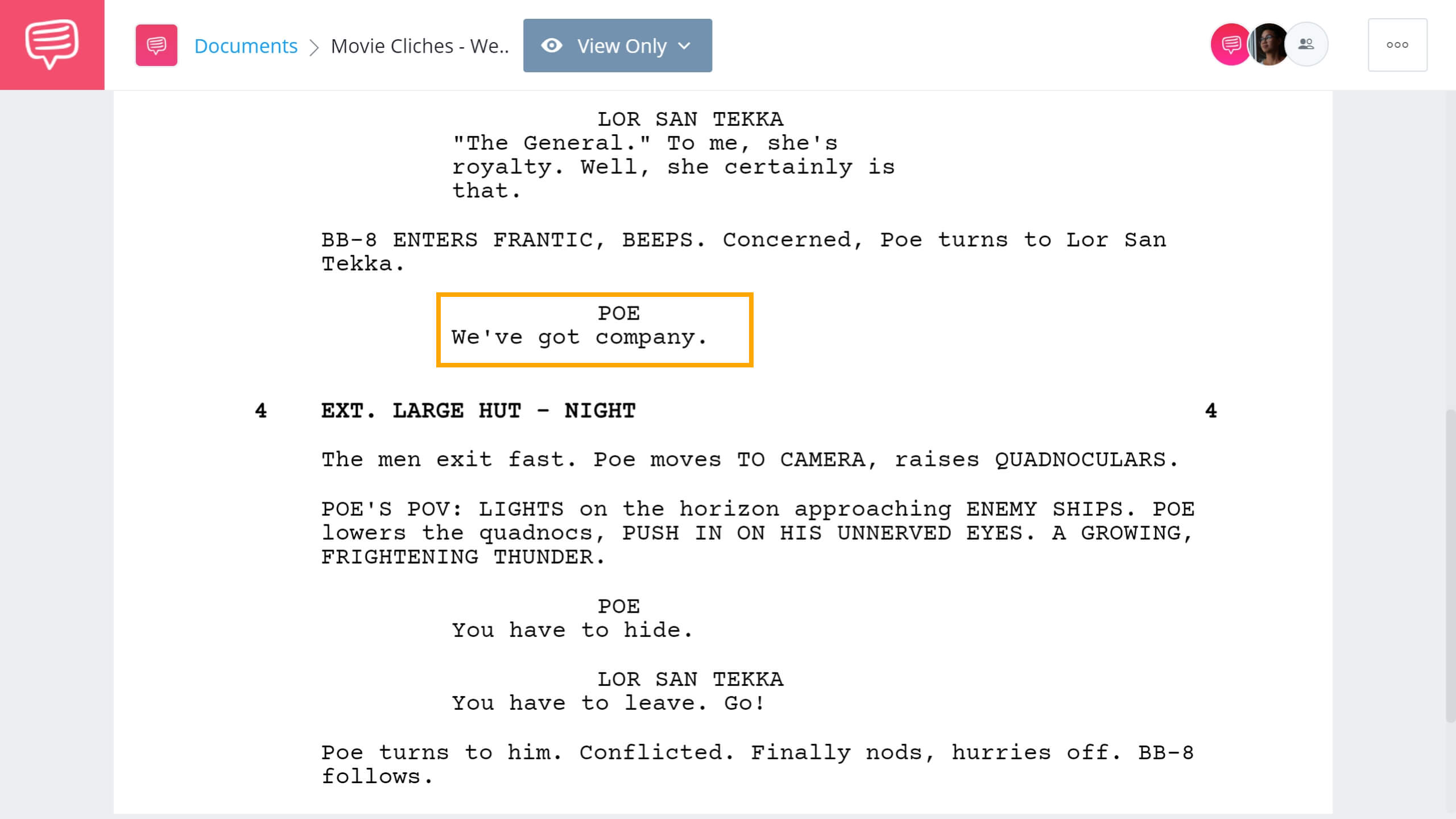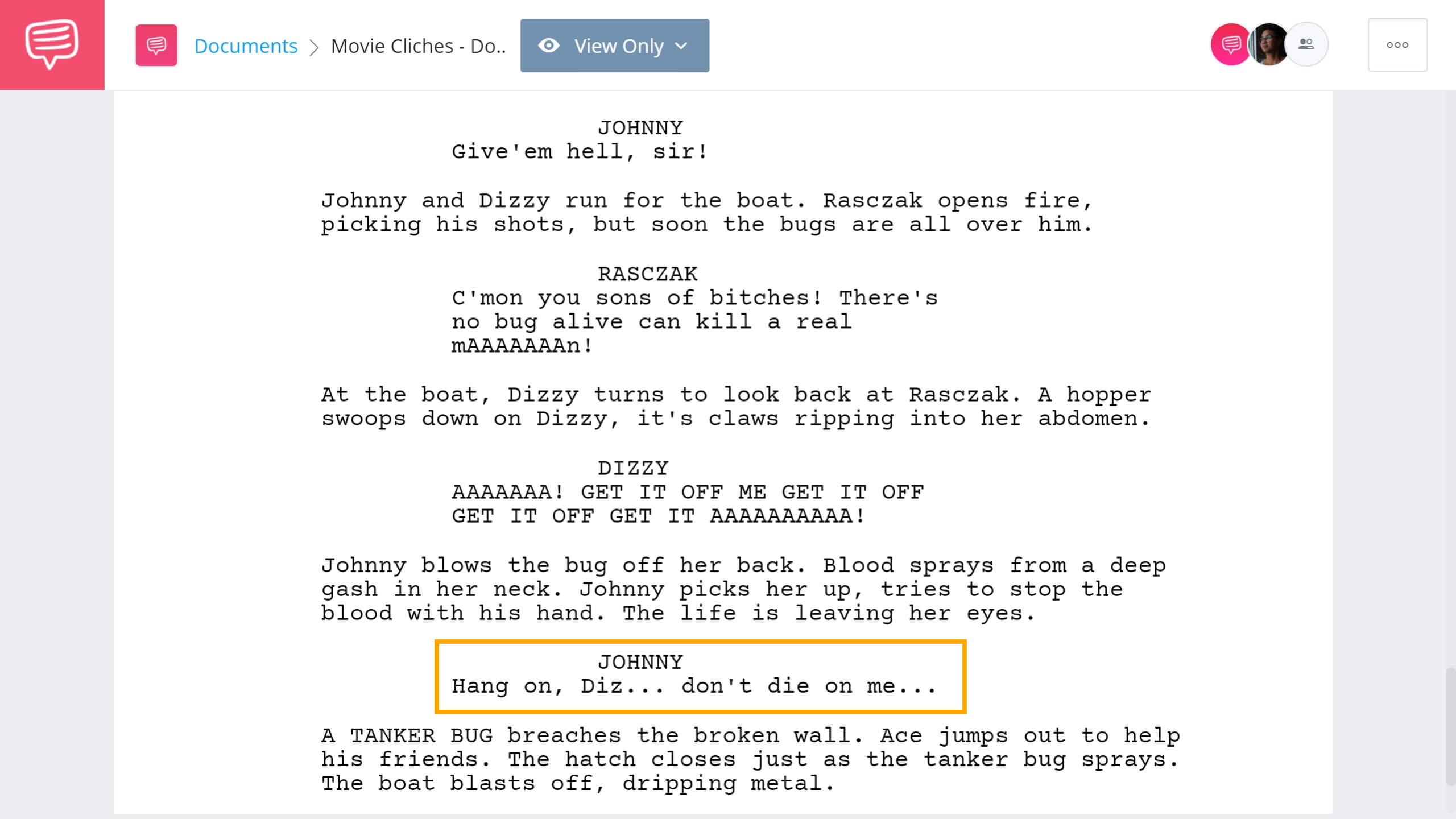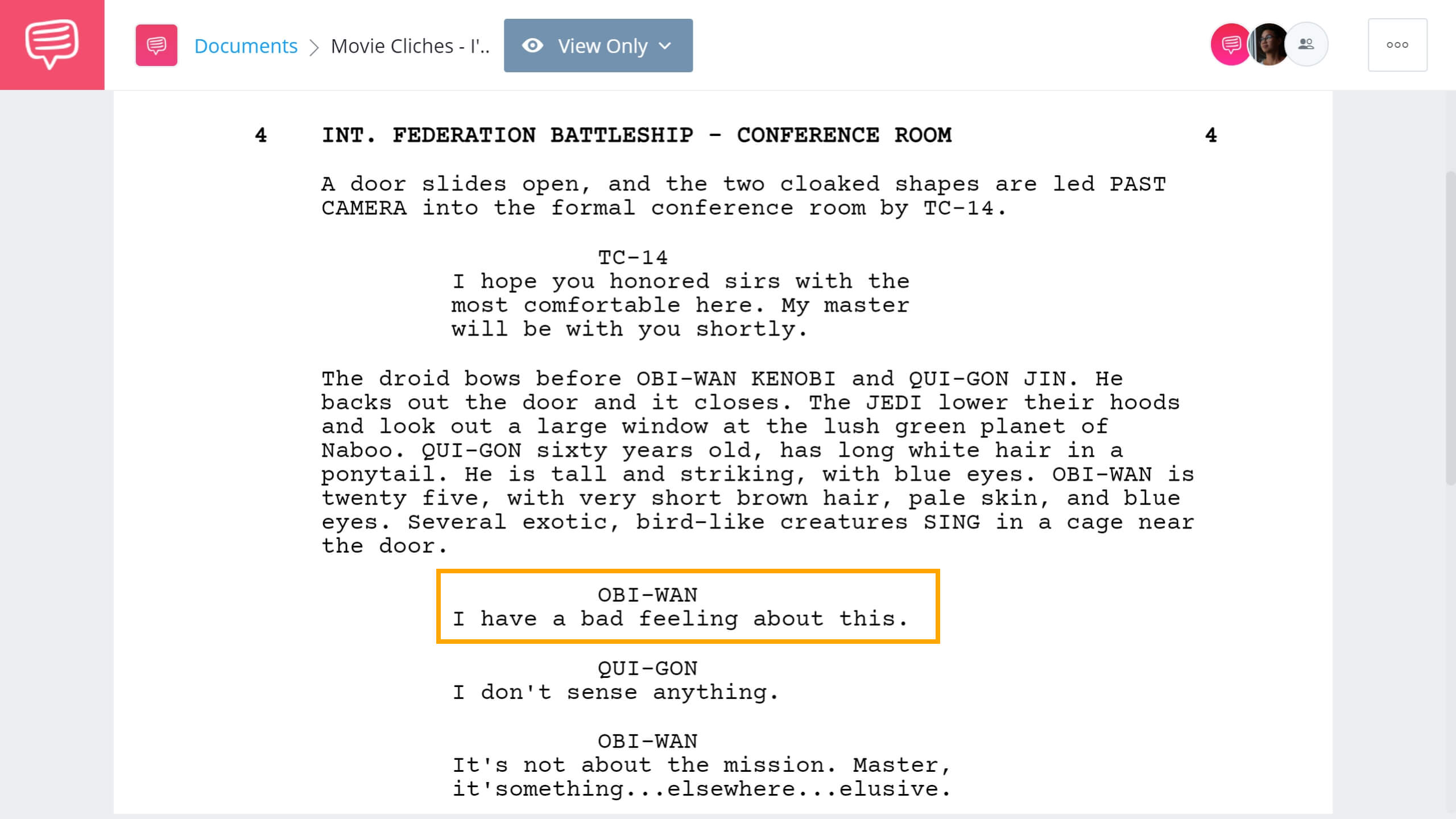A cliche is an expression in any artistic work that has been overused to the point of losing all meaning. A car failing to start while a killer is hot on the protagonist’s tail may have once worked as an effective way to build suspense. But now, audiences are more likely to roll than eyes than genuinely fear for the character. It’s time to put these movie tropes and cliches to bed…for good.
The following movie tropes list is in no particular order. Some are pieces of bland dialogue while others are plot points that have been done to death. We’re sure you can go through this list and find some examples of movies that did them well. But by and large, if you want to improve your screenwriting, you need to move past cliches and overused movie tropes if you want a script that really impacts the reader.
Overview
Let's talk about movie tropes & cliches
After all, the only way to get a good movie is to have a good screenplay. It all starts with the writing. So keep these movie tropes in mind as you work on future stories. If nothing else, it could help you find unique ways to tell your story and make a movie that is far more memorable.
Do you remember the scene in Rick and Morty where Morty is forced to listen to the old lighthouse owner’s tale? And in this case, a tale means a poorly-written screenplay.
Aww Jeez... Sorry! Keep going.
Part of Morty’s frustration surely comes from the fact that this screenplay is riddled with bland characters, cheap gimmicks, and the worst movie tropes.
Movie Tropes List
1. The ticking clock
Building tension in a scene can be tough. However, if you have to resort to a literal ticking time bomb to emphasize the stakes, then you should try to pass the time some other way. From The Dark Knight Rises to Don’t Let Go, plenty of movies rely on this tired device that deserves a refresh.
Action movie trope example • The ticking clock
SNEAKING UP ON YOU
2. “They’re behind me, aren’t they?”
How many times have you talked about someone behind their back, only to discover they were behind your back the entire time? Unless you live in a sitcom, we’re guessing the answer is never.
Film tropes like this have worn out their welcome
STORMTROOPER EFFECT
3. Villains with terrible accuracy
While the hero is in danger, you don’t want them hurt. This usually results in a bunch of goons shooting aimlessly at the protagonist and missing in spectacular fashion. You get double cliche points if the hero is able to shoot down all of the bad guys without missing a shot. And speaking of shooting…
Star Wars movie tropes
Movie Cliches 101: Infinity Gun
4. Guns never run out of ammo
You don’t have to be a genius to know every gun only has a certain amount of ammo in the barrel. This is especially true when it comes to handguns and shotguns. The most egregious example of this in recent memory was in Season 2 of The Walking Dead. Hershel defends his farm from a horde of zombies, and apparently, he sold his soul for a gun he never has to reload.
Horror movie tropes, courtesy of The Walking Dead
If You’re Going to Get Shot Anywhere...
5. Shot in the shoulder
In the event our hero does suffer a wound, 9 times out of 10 it will be in the shoulder. Writers seem to think there’s nothing of importance in your shoulders, but they’d be wrong.
There is both a brachial artery and subclavian artery in your shoulders, and a bullet hitting either one could lead to dramatic blood loss. You certainly wouldn’t be able to keep on fighting. Leave it to Monty Python to turn this trope example to the extreme.
Action genre tropes to the extreme
RELAX...
6. It’s just a cat
Jump scares are already pretty cheap. However, when you illicit fright out of the audience only to reveal that it was just a cat, it feels a little insincere.
Movie cliches like this are destined for extinction.
YouTuber Slacktory created a compilation of all the times cats jumped out of nowhere to scare the lead and the viewers. Why can’t one movie do something original for once and make the cat the killer?
One of the laziest horror movie tropes
Oh, Come On...
7. “Hot, but doesn’t know it.”
This is Hollywood. Anyone cast in your movie is automatically going to be hot, so there’s no need to specify, especially when you follow it up with, “But doesn’t know it.” How would someone not know they’re hot?
It’s a description you can do away with, even if it does appear in the otherwise fantastic screenplay for Whiplash.
I'm sexy and I (don't) know it
It Came to Me in a Dream
8. Dream conveys plot information
A dream sequence can be trippy and surreal. It can make for a nice break amongst the action. However, when you don't use it to move forward the plot because you can’t think of any other way to do it organically, it becomes a problem.
It was all in my dream!
When You Need Shorthand
9. Cutting hair to convey trauma
There are many ways to show that a character has been through a lot. So why do so many screenwriters resort to having a character (who’s usually female) convey this experience by cutting her hair?
It becomes particularly abhorrent when she can give herself a perfect hairdo using only a pair of scissors and dim bathroom lighting.
One of the most common female character tropes
Blame Blade Runner
10. Enhance
Have you ever tried zooming in on a photo on your phone? Chances are the picture gets pretty blurry after a while. You can’t actually enhance pictures to make out details you would overlook otherwise.
We suppose even the best sci-fi films get a pass on this one because who knows what cool features the iPhone 30 will come with.
Enhance the reflection in her eye!
Hope You Have Enough for Everyone
11. “We’ve got company.”
How many times have you ever heard anyone earnestly say, “We’ve got company.” Even when you have company coming over to your house, no one actually says this. They probably just say, “Tony is here.”
However, if someone used this line in a movie when people were actually coming over for dinner, that would be funny. Otherwise, this is one of many movie cliches that we can do without.
We got company!
Here’s this ongoing movie trope example in the screenplay of Star Wars: The Force Awakens that we imported using StudioBinder's screenwriting software. Click the script below to read the entire scene.
Movie Cliché Quotes • Read the Full Scene
They’re Watching You
12. The medicine cabinet reflection
When you see a movie character open a medicine cabinet in a horror movie, there’s a 99% chance something will be in the reflection when the door closes. It’s bizarre that when a film is trying to scare you, it resorts to something you will see coming from a mile away.
One of the classic but tired horror movie tropes
Movie Cliches & Dying
13. “Don’t die on me!”
You think anyone ever got really close to death only to be told, “Don’t die on me” and lived? Yeah, we thought not. This is one piece of dialogue that should go ahead and die on us.
Don't die on me now!
Here's a "classic" action movie cliche scene from the screenplay of Starship Troopers. This example gets a small pass because of it's (mostly) a satire. But there are plenty of other movies that take this line very seriously.
Movie Cliché Quotes • Read the Full Scene
I’m Inside the Mainframe
14. Any kind of hacking
Hacking always looks far flashier than it actually is. If you have to include hacking in your script, then it would pay off to do some research into what it actually entails. You may find that hacking into the Federal Reserve is actually pretty tough.
You seem to know your way around a computer...
You Think?
15. “I’ve got a bad feeling about this.”
If something bad is about to go down, you usually don’t have to broadcast it. The problem is that most of the time, there’s no reason to say it. It would work better if everything was going well, but a character had a predilection toward disaster. Whatever the circumstances may be, find a better way to phrase this.
I got a bad feeling about this one...
Here’s this ongoing Star Wars series cliché in the screenplay of Star Wars: The Phantom Menace.
Movie Cliché Quotes • Read the Full Scene
Come On, Now. Really?
16. Being a nerd for something not that nerdy
Everyone has seen Star Wars and Game of Thrones was a massive hit with fantasy enthusiasts and mainstream audiences alike. So why is that whenever a character references one of these, they’re labeled a nerd? We suppose because if they actually did say something too nerdy, it would alienate too much of the audience.
They would never cancel Game of Thrones...
It’s Not That Hard to Understand
17. “English, please!”
What do you say when someone says something you don’t quite understand? Do you politely ask them to repeat it, or do you make some quippy remark that’s been in every hacker movie since the dawn of time? It's about time we retire this movie trope.
English m*therf*cker, do you speak it!?
Real Geniuses Are Kind of Dumb
18. Geniuses who know everything
Most actual geniuses don’t really know all that much. They’re great in their field of study, but you wouldn’t go to a dentist to get your car fixed. So why is it you have geniuses like Dr. Gregory House who are amazing doctors but can also speak a dozen languages and are classically trained to play the piano?
Sure, there may be a super genius out there who can do it, but you have to ask yourself: “Is my character really this smart?”
Too smart for your own good.
Is There, Though?
19. “There’s no time to explain!”
Here’s the thing. If these characters just took 10 seconds to explain the situation to someone else, then chances are things would go much more smoothly. As it stands, this line is typically just a lazy way for the screenwriter to get out of revealing information too soon.
No time to explain!
The Grand Finale
20. Deus ex machina
Deus ex machina translates to “God of the machine.” It applies when a character is saved from certain doom from something behind their control. It’s lazy, and you want characters to find their own ways out of problems rather than just being saved from a random force.
I'm out of options, it's all you, God!
For more insight into better screenwriting, check out some of our other blogs on the topic. By knowing what’s unique and what’s worn out, you can write more engaging scripts that have a better chance of becoming awesome movies.
UP NEXT
Tips to writing better dialogue
We've covered some of the most egregious movie cliches in this post and now it's time to replace those tired phrases with better dialogue. We'll go over very simple but proven writing techniques to take your dialogue from zero-to-hero in no time.



